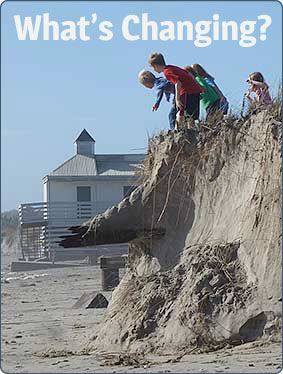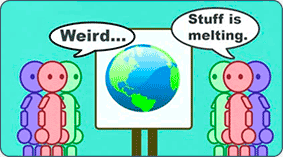
Photo Credit: Kate O’Kula
Global warming sounds nice, but what does it mean?
And why “climate” is not “weather.”
Weather forecast for tonight: dark.
Weather forecast for tonight: dark.
~George Carlin
~George Carlin
Science, facts and figures are essential to the understanding of climate change, and making future projections. But the data and research involved in analyzing climate change are most useful to the general public when translated into forms that describe and explain the real world impacts of shifting weather patterns and climate variability. So numbers, equations, charts and graphs aside, what are those impacts?
Climate science provides a view of a changing world that affects the robustness of the economy, the stability of society and the health of the environment that is our home. The expert analysis of those scientific facts and figures makes it clear that change is in the wind…and the ocean, the water, the seasons and more. The answer is not as simple as turning up the AC during summer heat waves. We need understandable information that can help coastal managers, land and water use planners, and the general public take to heart what changes must be made beginning now and actions that need to be taken in the future. Problem is, making future changes may require bigger and bolder steps if we don’t start walking in the path of climate righteousness now.


Climate is not Weather by Sean Cunningham
“Climate” is not “Weather”
Let’s get one point of confusion out of the way: “climate” is not “weather.” Weather is a discrete event that happens today or tomorrow or next Tuesday. Climate is the general trend of weather patterns over longer periods of time; for example, Rhode Island’s climate is hot and humid in the summer and cold in the winter. When climate scientists look at how climates differ over tens or hundreds of years, or even longer, then that is climate change. However, the climate change that scientists are now recording is happening so rapidly that ecosystems and the critters that are part of them cannot make the transition in a healthy or sustainable way. In fact, the climate is changing so rapidly that we will likely see very different and strange weather patterns during our lifetimes. Some scientists argue that major weather patterns have already been disrupted.
While climate is the general trend of weather — it’s hot and humid in the summer and dry and cold in the winter — it can also be counterintuitive. Blizzards in the Northeast that leave people bundled up and freezing at the business end of a snow shovel may be a distinct manifestation of global warming trends. Climate change does not mean you will experience rising temperatures in all latitudes; rather, it means that things will not be what they were.
“’Cause the times they are a-changin’.”
“Come gather ‘round people/ Wherever you roam/ And admit that the waters/Around you have grown/And accept it that soon/You’ll be drenched to the bone/If your time to you/Is worth savin’/Then you better start swimmin’/Or sink like a stone/For the times they are a-changin’.”
- Bob Dylan
The Times They Are A-changin’
News
Factoid
Between 1950 and 1980 dramatic weather events affected just 1% of the Earth’s surface. From 1980 to 2010 dramatic weather events have affected 10 percent of the Earth’s surface.
By 2100 global average temperature is expected to warm at least twice as much as it has during the last 100 years.
Snow cover in the Northern Hemisphere is expected to decrease by approximately 15% by 2100.




